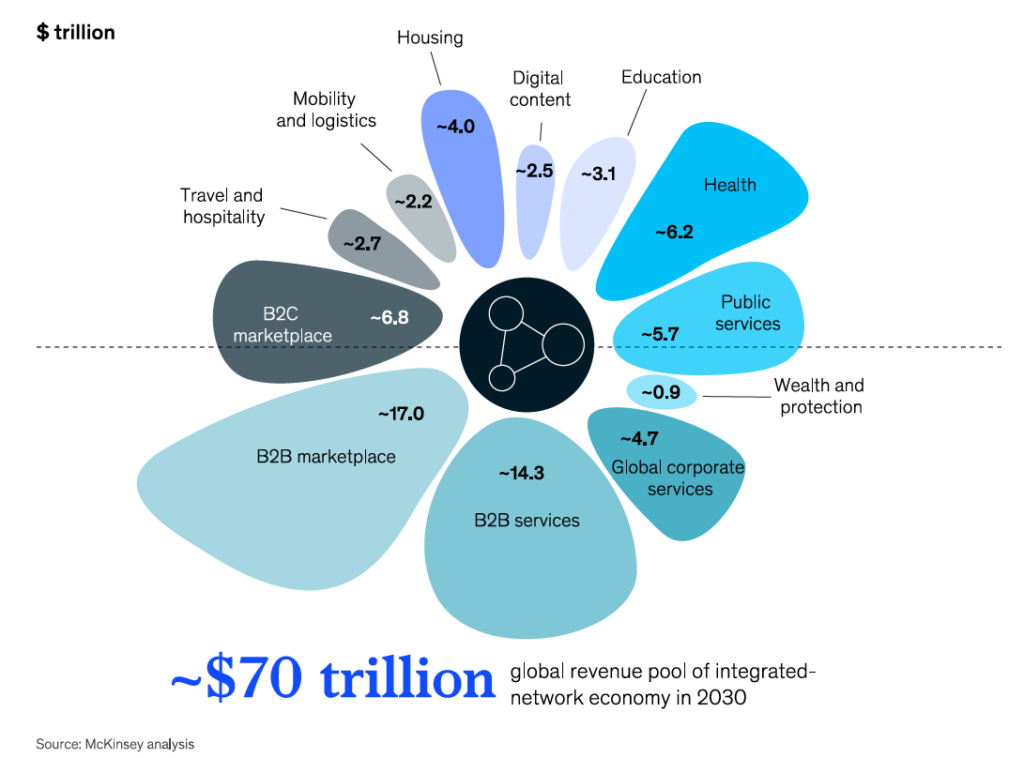How no-code can accelerate the ecosystem economy
Codeless innovation enables flexible collaboration and secure data sharing, accelerating the ecosystem economy.
As discussed in our previous blog, companies must embrace digital innovation to stay competitive in our fast-moving business world.
One way businesses strive to outpace the competition is by joining or creating digital ecosystems – integrated networks of organisations that bundle services to deliver end-to-end solutions.
The rise of the ecosystem economy
Digital natives and incumbents alike are turning towards ecosystem models to gain access to new markets, increase their relevance to customers, and increase revenues from new products and services.
Key drivers for the growing ecosystem economy include:
- Increasing customer demand for seamless experiences and end-to-end solutions;
- The “as-a-Service” trend has expanded from goods to services (e.g. professional services), multiplying the ways partners can plug into ecosystems; and
- Points of sale are increasingly bundled and automated to satisfy customer desire for convenience.
By 2030, the ecosystem economy is projected to represent a global revenue pool of USD 70 trillion USD, up from $940 billion in 2021.

The lasting effects of the Covid-19 pandemic on how we consume, work, and communicate have only accelerated the rise of digital ecosystems. Indeed, 71% of consumers indicate they’re ready for integrated ecosystem offerings.
What do businesses need to become successful ecosystem players?
Although businesses are increasingly turning to digital ecosystems as part of their innovation plans, only 10% of companies who launch ecosystem strategies actually improve their financial performance.
There are several common challenges amongst organisations that fail to create or join digital ecosystems:
- Insufficient investment in the time and resources needed to transition to an ecosystem model;
- Incompatibility between the ecosystem partners; and
- Digital interfaces and means for data exchange within the ecosystem are underdeveloped, especially for SMEs.
How can businesses, especially those with limited resources and experience with digital transformation, overcome these challenges to successfully join the ecosystem economy?

A codeless approach to digital ecosystems
No-code development presents a new lever for businesses to participate in the burgeoning ecosystem economy.
Inventify’s industry-agnostic platform, explicitly designed for B2B SaaS builders, offers a particular advantage for B2B businesses who want to pivot towards digital ecosystems.
First, businesses are able to build and launch enterprise-grade SaaS products without writing a single line of code. This ease of use and reduced development time allows business users to allocate the appropriate resources to execute their ecosystem strategies.
Second, Inventify provides one common platform upon which different parties can easily integrate with one another, as well as with third-party applications. And since all data on the Inventify platform can be fully encrypted, collaborators are able to smoothly and securely share data. This is a critical feature for industries where data security is essential, such as finance, law, and healthcare.
Third, our fully-managed platform maintains customisations across software updates. This removes the risk of mismatched technical maintenance between ecosystem parties. It also addresses the challenge that although businesses have incentives to collaborate in a digital ecosystem, they are not incentivised to build one integrated platform that enables ecosystems to develop and scale.
Building the business ecosystems of tomorrow
The wants and needs of customers across the globe are becoming more and more complicated. As our lives become increasingly interconnected, our products and services will have to become appropriately integrated. Organisations across the public, private, academic, and civic sectors will need to transcend traditional silos and form ecosystems that deliver holistic, end-to-end solutions.
No-code could and should play a critical role in creating the digital ecosystems that will keep global business innovation moving forward. To learn more about how your company could benefit from Inventiy’s approach towards ecosystem building, please send a message to: info@inventify.com.